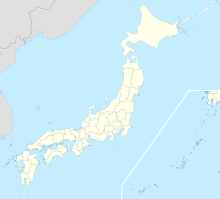This article needs additional citations for verification. (July 2024) |
Okinoerabu Airport 沖永良部空港 Okinoerabu Kūkō | |||||||||||
|---|---|---|---|---|---|---|---|---|---|---|---|
 | |||||||||||
| Summary | |||||||||||
| Airport type | Public | ||||||||||
| Operator | Kagoshima Prefecture | ||||||||||
| Elevation AMSL | 88 ft / 27 m | ||||||||||
| Coordinates | 27°25′54″N 128°42′20″E / 27.43167°N 128.70556°E | ||||||||||
| Map | |||||||||||
 | |||||||||||
| Runways | |||||||||||
| |||||||||||
| Statistics (2015) | |||||||||||
| |||||||||||
Source: Japanese Ministry of Land, Infrastructure, Transport and Tourism[1] | |||||||||||
Okinoerabu Airport (沖永良部空港, Okinoerabu Kūkō) (IATA: OKE, ICAO: RJKB) is located on the island of Okinoerabujima in the town of Wadomari, Ōshima District, Kagoshima Prefecture, Japan.
History
Okinoerabu Airport was opened on 1 May 1969 with a 1200-meter runway, and was officially certified as a third-class airport by the Japanese government on 31 May 1969. In order to handle operations by Bombardier Q400 aircraft, the runway was reinforced and lengthened to 1400 meters on 12 May 2005. The last commercial operation of the NAMC YS-11 in Japan was on 30 September 2006 on a flight from Okenoerabu to Kagoshima.[2]
Airlines and destinations
| Airlines | Destinations |
|---|---|
| Japan Air Commuter | Amami Ōshima, Kagoshima, Naha, Tokunoshima |

References
- ^ "Okinoerabu Airport" (PDF). Japanese Ministry of Land, Infrastructure, Transport and Tourism. Archived from the original (PDF) on 21 October 2016. Retrieved 7 January 2017.
- ^ Farewell to the wings of YS-11[permanent dead link] Yomiuri Online (Yomiuri Shimbun)










